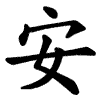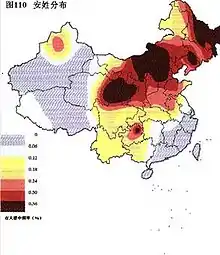An (surname)
The surname An is present in both Korea and China, though unrelated.(Chinese: 安; pinyin: Ān) literally means "peace" or "tranquility". It also serves as an abbreviation of Anxi (安息), meaning "Arsacid" in Chinese and can be romanized as On. Visitors to China who came from Arsacid-held territories often took the name An. In 2008, it was the 110th most common surname in the People's Republic of China, shared by over 1.7 million citizens.[1] The surname is most common in Northern China. It is the 79th name on the Hundred Family Surnames poem.[2]
 | |
| Origin | |
|---|---|
| Meaning | "peace", "tranquility" |
| Region of origin | China (also in Korea) |
| Other names | |
| Variant form(s) | Ahn |
During the Song Dynasty, another An (俺) was a Jewish Chinese surname.[3][4]

Origins of An (安)
Parthian
During the Qin and Han Dynasty, the most common origin of the surname An was as a contraction of Anxi, meaning "Arsacid", and was thus given to people of Arsacid-territory origin, such as An Shigao, a nobleman from the Arsacid Empire. An Xuan, another Parthian, followed An Shigao to Luoyang and assisted in his translations of Buddhist texts.
During the 3rd Century, An Faqin (安法欽), a Parthian Buddhist from the Parthian Empire, came to Xijin (西晉).
Sogdian
In the Tang Dynasty period 9th century, An was also sometimes used as the name for the region of Sogdia; previously, Sogdians had exclusively used the surname of Kang (康). The addition was due to the existence of two Sogdian kingdoms, identified as An and Kangju; the state of An was accordingly named due to its occupation by the Arsacids.[5][6] It is considered one of the "Nine Sogdian Surnames."[7]
Xueyantuo
During the Northern Wei period in the 6th century, Anchi/Anzhi (安迟) was the Xianbei surname of Uyghur people (回鶻人) a division of the Hui people; they later reduced the surname to An (安). During the Tang Dynasty in the 8th century, the An (安) family name was used among the Xueyantuo (薛延陀) people.
Khitan
During the Qing Dynasty, Ardan (阿爾丹) the Daur people (達斡爾族) were given the surname An (安) with the Ar dialect.
Notable people
Historical figures
- An Shigao (安世高), the first Buddhist missionary to China and a former Parthian prince
- An Xuan, who followed An Shigao to Luoyang several decades later
- An Faqin (安法欽), Parthian Buddhist in Xijin (西晉) the Chinese state
- An Lushan (安祿山), Sogdian-born provincial military governor during the Tang Dynasty
- An Chongzhang (安重璋), Sogdian general and Duke of Liang during the Tang Dynasty who had his name changed to Li Baoyu amid the An Lushan Rebellion (to distance himself and his family from the notoriety of the rebel An Lushan)
- An Yanyan (安延偃), adoptive father of An Lushan, Iranian origin, rumoured to have been surnamed Kang originally[8]
- An Qingxu, son of An Lushan
- An Chonghui (安重誨), a minister of Later Tang
- An Congjin (安從進), a general of Later Tang and Later Jin (Five Dynasties)
- An Chongrong (安重榮), a general of the Later Jin (Five Dynasties)
Modern
See also
- All pages with titles beginning with An
- All pages with titles containing An
- An (disambiguation)
- Ant (name)
References
- "中国最新300大姓排名(2008 [Statistics on the number of citizens with each surname in China, based on records of National Identity Cards]." 2009-01-06. Accessed 20 Jun 2015.(in Chinese)
- K. S. Tom. [1989] (1989). Echoes from Old China: Life, Legends and Lore of the Middle Kingdom. University of Hawaii Press. ISBN 0-8248-1285-9.
- M. Avrum Ehrlich (Ed.). The Jewish-Chinese Nexus: A Meeting of Civilizations. Routledge, UK, 2008. ISBN 978-0-415-45715-6
- Chang, Hsiang Wen (1945), "An Early Chinese Source on the Kaifeng Jewish Community", Folklore Studies, 4: 327–331, JSTOR 3182906
- Xue, Zongzheng (1992). A History of the Turks. Beijing: Chinese Social Sciences Press. ISBN 7-5004-0432-8. p. 329, 602-606
- Ebrey, Walthall, Palais (2006). Encyclopedia of China (Chinese History Edition), 1st ed.
- https://sogdians.si.edu/sidebars/the-nine-sogdian-surnames/
- An Lushan's biography in the New Book of Tang, in addition to indicating that his original name was Galuoshan, also indicated that his original surname was Kang, implying that his father was surnamed Kang. However, his biography in the Book of Tang indicated that An Lushan "originally did not have a surname." Compare Book of Tang, vol. 200, part 1, with New Book of Tang, vol. 225, part 1.